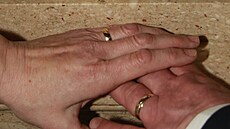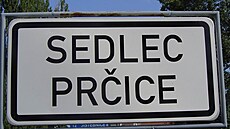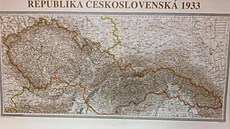Jak se vidíme
Nedá mi to a zareaguji. Snad na to mám trošku právo, v Anglii jsem strávil téměř dekádu svého života. A mám Starou dámu moc rád. Stejně jako se s láskou vyjadřuje zmíněný autor o matičce Praze a nás, co tu máme svůj domov.
Moc a moc chápu jeho pohnutky a pocity. Také mi bylo všechno na severozápadním okraji Manchesteru napůl blízké a napůl cizí.
Autor sepsal svůj blog jako desatero toho, co jej v Praze, potažmo ČR překvapilo a co by jeho krajani měli očekávat jako "divné". Sám se za podobná hodnocení v úvodu omlouvá, ale z celého jeho textu je vážně vidět, že svého rozhodnutí přestěhovat se do Prahy nakonec vůbec nelituje.
Osobně si myslím, že bych dokázal našemu způsobu žití, národní nátuře, či chcete-li naší vlasti vystavit i mnohem horší vysvědčení, ale on to nedělá a to je dobře.
V článku budu citovat pasáže z autorova desatera, a to v originále a bez překladu (a kurzívou). Jednak doufám, že čtenáři, které tohle téma zaujme, základní angličtinou vládnou, druhak nechci narušit necitelným překladem autorovy jemné myšlenky a třeťak máme snad google překladač, ne? :-) A také předesílám, že zdaleka necituji celý půvoní článek, tedy velmi doporučuji si jej přečíst v originále. Jako bonus tam dostanete moc pěkné fotky.
Než začnu přímo s oním desaterem, něco málo z úvodu článku, ať mi uvěříte, že autor si Česko vážně zamiloval:
Moving to a new country can certainly be a very strong life experience. No matter how much I was travelling before, and all the knowledge and experience I had accumulated on intercultural learning, culture shock and stuff like that, the fact of actually moving to Prague, Czech Republic in 2015 still hit me like a truckload of bricks.
Granted, Prague is a wonderful place to live in (and one of the main tourist destinations in Europe) and I don’t regret at all my decision. Still, at times it may be hard. That’s why I decided to write this post which will be a bit more silly than the rest of the stories I publish on this blog.
A nyní prosím autorovo a moje desatero:
1) For Czech Republic, Prague is “The Capitol” from The Hunger Games.
Here in the Czech Republic, Prague is really THE city. Everything happens there, and all the power seems to be concentrated in one place. Politics, culture, media, jobs, opportunities. People just live different lives than in the rest of the country, can do strange things like being vegan or have an Asian brunch, they wear fancy clothes and have blue or purple hair.
Prague natives are also somewhat proud of their local accent (which to me sounds funnier, slower, with longer vowels, and seems to be really hated by everybody else in the country).
Salaries are way higher than anywhere else, but so is rent (like two, three times more), eating out and basically everything else.
But if you travel just outside of the city, you will enter a different country. Small-town Czech Republic will present different challenges of course (be prepared to attract puzzled looks as a foreigner, and almost nobody will understanding a word of English, for example), but it will also provide with unique rewards and many hidden gems.
Seriously, plan a trip to explore Czech Republic outside Prague, when you have a chance. You will be rewarded.
Nu, věru nevím, čím je autor tak překvapen. Moje zkušenost ze Spojeného království je snad ještě intenzivnější než ta jeho česká. Londýn je stát sám pro sebe a vše na sever od Watfordu je pro jeho obyvatele necivilizovaná divočina, jakkoli najdete v Anglii několik dalších milionových velkoměst. A anglický, neřkuli velšský či skotský venkov? Tak to byl pro mne jiný vesmír , nejen země. Jak rád jsem tam jezdil. Ovšem jeden rozdíl snad vidím. V Česku je terčem posměchu a opovržení majitel auta s odpudivým Áčkem na registrační značce kdekoliv na venkově. Ne tak v Anglii, tam je předmětem shovívavého odstupu ten, kdo denně neabsolvuje dopravní zácpu na cestě do práce v City.
2) A lot of people seem to be in a bad mood. Always.
The average Czech you meet in the street will most likely be in a great hurry to be somewhere else than in your presence (see point #7, below), and will look like they just had a very bad day. Even if it’s early in the morning – maybe even worse. This grumpiness extends to driving (= no patience at all for the slightest hesitation or mistake) and public transport (= if you stand in the wrong line or place, someone will correct that. Probably by pushing, elbowing or stomping on your feet). At least, in Prague. Having to rely on a random act of kindness by a stranger can be an experience that requires patience. For your own good, try never to be confused by the bureaucracy in a public office, and never, ever get stuck with your car on the side of the road.
Inu, to je pravda. Sám jsem to zaznamenal. když jsem se domů po té době vrátil. Ale! Zase ta Vaše strojená vstřícnost, optimismus a křečovité úsměvy taky nejsou nic moc. Jen si například pamatuji, jak jsem se vždycky snažil popravdě odpovídat na otázku "jak se máš" a velmi rychle pochopil, že vás to nezajímá, jen mi tím jinak říkáte "ahoj" a smějete se u toho jak blázni od ucha k uchu.
3) Language is hard. I mean: real hard.
No, seriously. Sources disagree, but I read that it’s one of the hardest in Europe, and possibly in the world. It’s estimated that a person needs about 4 years of study to reach fluency (and I am not studying).
First of all, there are some factors that don’t encourage you to learn it at all. You can live in a social bubble that doesn’t speak Czech, for example. Or, you can just panic and stop going out altogether. I would know, I tried it.
But if you try to learn the beautiful language, at the beginning you feel like everything is against you. Accents and digraphs make for a stunning 42 characters in the alphabet (nice, uh?). Some sounds are also very specific to learn, with the terrible Ř that will give me troubles until the end of my life. It sounds like a drrj, by the way.
And then, grammar starts.
7 cases (for the first time in my life I am happy I studied all that Latin at school) and 4 genders (!): masculine, feminine, neutrum and masculine inanimated. The latter still doesn’t make any sense at all to me – as well to anybody else I asked, including native speakers. It’s for objects that are not objects enough to get the neutrum, maybe. I don’t know. The word for car (auto) is neutrum, while the train (vlak) is masculine. Go figure.
There are also (a few) good news. At least there are no articles, thanks to the cases. Which explains why many Czechs don’t know what to do with articles in languages like English or French. And the verbs and prepositions are not such a horrible mess as in Italian.
Not only Czech is a slavic language, but it’s considered the model for many other languages of the group. Which means, more “pure” and with less foreign interferences. Arranging an appointment or a date is a challenge, since you have to learn even the names of the week days and the months from scratch. Your only hope for help is if you speak Polish or Slovak, and that’s not exactly helping my case here.
The longest sentence without a vowel seems to be: Strč prst skrz krk (“stick your finger through your throat”). Try that next time, as a tonguetwister!
Edit: as Petr E commented, the longest sentence without a vowel seems to be different. “Blb vlk pln žbrnd zdrhl hrd z mlh Brd skrz vrch Smrk v čtvrť srn Krč.” (A dumb wolf full of bad drinks proudly excaped from the mist of Brdy forest through Smrk hill into the deers’ district Krč).
Tenhle odstavec jsem ponechal skoro beze změn, tak se mi líbil. Nikdy bych netušil, že se od Angličana doučím nějaký český jazykolam. A ten jeho překlad! No, je to talent. Ale zpátky k Anglii. Víte, já jsem se pilně učil. I angličtinu. 3 roky soukromých lekcí na základní škole. Pak 4 roky na gymnáziu. Poté plné dva semestry na vysoké škole. A v dospělosti 6 měsíců intenzívního kurzu v daleké Kanadě. A víte co po přestěhování do Anglie? Se všemi těmi diplomy a zkouškami? Prd!!! Myslíte, že jsem se domluvil s dělníkem na stavbě v Liverpoolu, kam jsem přivezl beton? Nedomluvil ani vomylem! Oni anglicky totiž moc nemluví. Byť si to myslí a odvolávají se na Beatles. Ale jinde docela jo. I v Manchesteru bez problémů. Ale stejně jsem si v Anglii nejvíc pokecal polsky.
4) Eating & Drinking habits can be equally intense.
Czech Republic is famous for its beer, and rightly so. Czechs are well aware of it. They seem to be the biggest beer drinkers in the whole world (followed by the Seychelles. Which makes sense. What else are you supposed to do, if you live on a paradise island? Drink until you explode, obviously).
A Czech drinks an average of 142 litres of beer in a year, which makes for almost a pint a day, each day, for every man, woman or child living in the country. Not bad at all.
This helps to put a lot of things in context, for example the first time I met my father-in-law, and we all ended up totally drunk, before having dinner. But no worries, Czechs also love drinking wine, as well as everything else with alcohol. All in the name of health (na zdraví) of course. Of course.
When you are at it, try Kofola. It’s the national alternative to Coca Cola. I find it more refreshing!
No, pravdu má, chlastáme, o tom žádná. Ale zastal bych se nás v tom, jak. U nás není v módě - ještě, doufám - ono binge drinking. A obecně, my pijeme více pro radost, Angličani snad pro zapomnění denních trablů a daleko více je tam kriminality spojené s pitím, snad proto, že v denním životě jsou jejich bezprostřední a přirozené projevy příliš korigovány "politickou korektností" a pak se opijí a dělají a říkají věci, že by se jeden styděl. Pijí jinak a můžeme to kolikrát vidět i při jejich návštěvách u nás. A že jim chutnala naše Kofola i s příběhem o vzniku alternativní Coca-coly za železnou oponou, tak o tom též něco vím. Vozil jsem jí jim tam.
5) People like to be naked and to go around just like that.
Now, nothing could prepare me for this. Czechs have a very casual approach to nudity (which somehow extends to sexuality at least in part, but that’s another story). Be warned when you accept an invitation to go to sauna, for example. In most places it’s actually forbidden to enter with your swimming suit on!
But not only. My friends here have absolutely no problem at all getting naked for a quick swim in the local river or lake, even with people having their picnics all around. It’s just a thing they do.
Tohle moc nechápu. Možná se autor pohyboval v jiných kruzích než já, ale budiž. Já tedy chodím doma také pouze v trenýrkách, děti tomu říkají, že jsem oblečen jen "v břiše", ale to je soukromí a navíc mám svůj věk. Každopádně může autorův purismus částečně vysvětlovat moje zkušenosti z červnové návštěvy Irského moře severně od Liverpoolu, kdy se naše rodina nadšeně vrhala do moře o teplotě 19 stupňů Celsia a okolokempinkující domorodci na naše plavky (mnohdy jednodílné) koukali opravdu nevěřícně. A možná tam mnozí kroutí hlavou dodnes nad naší nuditou. Takže ono je to relativní.
6) Xenophobia is on the rise. Except, maybe not really.
Now that’s worrying, when talking about Central Europe. Don’t take me wrong, it could be much worse (think Hungary, or Poland). Things here are still much softer, and Czechs don’t like to take an extreme point of view on racism – just as on many other topics. It’s not a culture of strong, radical opinions.
The country, and Prague in particular, has a very strong international vocation and is right in the middle between Eastern and Western Europe, which is why it has always been a natural crossroads of cultures.
But here is the thing, the whole place is a paradox. The international presence in the country is strong (about 4.5%), and in Prague, almost 10% of residents are non-Czech.
Also, two of the most visible political leaders in the somewhat-nationalist-area are Tomio Okamura (Czech, of Japanese origins) and Andrej Babiš (Slovak), media tycoon, Finance Minister and possible next Prime Minister. One would think that the country must be really welcoming towards foreigners, except… they try to convince everybody that it isn’t so.
Look. I don’t want to sound too strict or ungenerous. The truth is that the vast majority of the people I have met here have a big heart, a strong sense of hospitality, and are generous beyond words. And every time I try to remind them that I, too, am an immigrant indeed, the comment I receive is “naa, you are fine“.
And after all, I guess that’s the bottom line about racism. People from a different background look and feel scary at first, but after you meet them in person, you realise that naa, they are just fine. And this is valid everywhere.
So my final opinion on this is: maybe because of the media pressure or the general international situation, Czechs would like to portray themselves as intolerant and unwelcoming. Just to feel like everybody else.
But they fail, because… they aren’t!
Ano, také si myslím, že nejsme rasisté. Já jsem o tomhle mnohokrát psal, ještě když jsme v Anglii byli. A po Brexitu je to ještě zřejmější. Oficiální přístup k přistěhovalcům nebyl vždycky v souladu s cítěním domorodých Angličanů a tahle tenze se musela někdy projevit. Nechci moc filosofovat, ale příměr o jedu a léku se mi docela líbí. Není jedu ani léku, záleží jen na množství, říká stará moudrost. A v Anglii už se v mnohých oblastech lék počíná měnit. To je můj názor. Křečovitost multikulti (labouristického) přístupu jsme tam vnímali na každém kroku, možná právě proto, že jsem byli odjinud.
7) Time keeping and planning stuff is not a habit. It’s a national obsession.
Now this came from the words of Sabrina, a German (I said, German) volunteer who was in Prague for a period. “Czechs are totally obsessed with time!“, she cried. As I found out, it’s completely true.
Czechs are almost always in a hurry getting someplace or another, and they just love to keep their agendas as packed as possible, and then some. From the (early) morning till sunset, they just need to be busy. Work, leisure, culture and social time, everything is organised and planned and the more details, the better. When you are 5 minutes late, you are late (and people will be grumpy, see #2).
Ano, tady s autorem naprosto souhlasím. Protože mě zase strašně iritovalo, že Angličani mají na všechno divné míry času. Desetiletá zkušenost mě nakonec naučila převodní tabulku,kdy slíbené = znamená:
one minute = 5 minut
two minutes = 30 minut
ten minutes = významně více než půl hodiny
thirty minutes = přijeď radši zítra prosím
8) EVERYBODY is sporty and outdoorsy.
Aaaand – I am not.
Please take a second to appreciate how hard this must feel, sometimes. Really, every Czech is a natural born sportsperson and they all – I haven’t found an exception yet – love physical activity. Whether it be cycling, skating, running, swimming, parachute, indoor gym, martial arts – it doesn’t matter, as long as it involves moving, and sweating. And they do it with enthusiasm and total commitment.
This also applies to outdoors activities. Czechs love and respect their nature, and try to spend time in it as often as they can.
A hike that lasts less than 6 hours is not even considered being outside. They all seem to be mushroom and berries experts. In summer (and I suspect, in winter too) the rivers are packed with canoe and kayak enthusiasts. Entire families, babies included.
Really, if a zombie apocalypse or if nuclear war breaks out, I would feel really relieved to be surrounded by Czechs. These people are natural survivors. And they can always spare a sandwich.
Já tedy taky nejsem, ale na houby chodím, to jo, borůvku občas seberu a na řeku jsem, jako každý snad Čech, též kdysi vyjel. Takže má asi autor pravdu. Ale nevím, já jsem v Anglii zažil také mnoho ranních běžců vzhůru do smogu a vůbec nejvíc jsem se smál kanadským sporstmenům, kteří uprostřed divočiny sedli do auta a jeli pár set metrů do "gymu" , kde si zaběhali na pásu a pak zase pěkně autem po téměř lesní cestě nazpět domů. Ovšem - s cedulkou vyjetou z tiskárny přístroje, na kterém naběhali doložitelně svých x kilometrů.
9) Public transport takes you everywhere, but people still take their cars.
This must be one of the few really good things that Socialism has left in the country. The public transport is excellent: rides are frequent, the system is organised and efficient. I take my car maybe once, twice in a month (how does it feel compared to Italy, I leave to your imagination).
In Prague metro and tram tickets are still a bit of a funny business, relying (incredibly) on the little obsolete, yellow machines which are out of order 50% of times, and only accept coins. Weird. But since I have my yearly pass, I feel I can get anywhere, simply and reliably. This includes extra-urban transport, and every little town seems to be connected to the network in somewhat of a satisfying way.
So why do Czechs still own – and drive – cars? Finding a parking place in Prague is as hard a job as in Napoli, and that simply doesn’t make sense to me. Probably the answer has something to do with #7 of this list, the time obsession. I hear people saying: “Sure, I can go to work by tram, but if I take the car it will save me 12 minutes“.
Vím, vím a rozumím. Pražská doprava musí být pro cizince zážitek. Na jednu stranu je velmi přesná a předvídatelná a čistá a na druhou tak trochu divoký východ, třeba jen linka 22. Ale já mám zase zkušenosti , kdy v Manchesteru jsou jízdní řády jen orientační, za vypadlý spoj se náhrada nekoná (myslím tím ani spoj třeba do Londýna), půl centimetrru sněhu je důvod zrušit veřejnou dopravu komplet do odvolání/roztátí kalamity a o čistotě ve vozech si vážně nedělejte iluze. Ovšem, poděkovat řidiči za to, že vás odvezl na požadovanou stanici bezpečně, to je standard a dělají to malí i velcí a když to při výstupu neuděláte, jste nevychovanec.
10) Czech Republic is a place where Etiquette still matters. A lot.
This was a big surprise for me, and it can be very important in a relationship, so listen up, don’t repeat my mistake and don’t underestimate this aspect.
The Czech culture is based on a certain level of conformism. Traditions are important and nobody is expected to cause any trouble. There is no such thing as “speaking in a loud voice” (a common discussion between two Italians on what to have for dinner would appear like an incredibly aggressive brawl, here) and I have never heard people shouting – except when drinking too much, of course.
In CZ, people really care for things to be – and look – proper. You go to theatre, you dress up. There is no limit “up”. But you just don’t walk in a theatre (or God forbid! Opera) in your jeans, unless you want to attract a lot of attention of the wrong type.
As well, men are supposed – no, expected! – to perform little actions such as opening a door, holding the chair, helping ladies with their luggage or taking on and off their coats. Apparently in the local understanding, there is no “gender inequality” value attached to it. So don’t try to judge it with your metrics: it’s just the way things work. If you want to blend in, you just adapt to it.
All boys and girls take ballroom dancing lessons as part of their education, and many companies and organisations hold balls in the festive season, which are attended with enthusiasm. Also, in a country that is surprisingly not attached to any religion, people still follow traditional festivities, go to church on Christmas eve, visit the cemetery to pay their respects.
All this, combined with what I said in #2, can be dangerous to the unsuspecting foreigner. In a tram, failing to leave your seat to an elder will attract so many bad looks, you will wish to disappear. Equally bad is when you mess up with the tipping in a café or a restaurant.
Tak tenhle odstavec jsem také nechal tak jak byl. Dodám k němu jen jediné. My jsem naopak byli po příjezdu do UK mile překvapeni tolerantností okolí, k tomu, jak kdo vypadá či jak je oblečen. Já vím, že to není o garderobě do opery, ale na ulicích bylo všem vážně jedno, jestli mám na sobě džíny anebo pytel od brambor. Má to jistě i druhou stránku věci, kdy běžně vidíte před (státními) školami ráno doprovázet jednotně nastrojené dětičky v líbivých uniformách rodiči v županech a pantoflích....
Desatero skončilo, takhle nás vidí a na oplátku takhle vidím já je. Doufám, že podobně laskavě.
Jan Andrle
Útok pizzou

jsme báječná bezpečná země, o tom není pochyb, ale stejně, jednotlivé útoky zde jsou, i bizarní, tak jak se stalo večer nám...
Jan Andrle
Chlapovo štěstí

Jo, to byl ten starej svět. Dobrej. Chlap přijel z práce domů a tam bylo navaříno, naklizeno a načekáno, že až se nají....
Jan Andrle
Nový oblek

Jak slíbil, tak udělal. Sliby se mají plnit, že. A já to stihnu nejen do vánoc, ale dokonce do velikonoc. Tady to je, přátelé blogeřníci.
Jan Andrle
Turnus

Ono to není snadné, pracovat v turnusu. Ještě u jednoho by to se celkem sneslo, ale u dvou...to už je dost
Jan Andrle
Doprčic!

Jo, youtube přináší leckterá pokušení. A pro předpubertálního autistu velmi lákavá. A ne vždy jste sto usledovat, co tam zrovna sjíždí. A pak se divíte.
Jan Andrle
Žárovka

Jsem blb. Nikdy bych si to nepřipustil, ale je to tak. K prozření stačilo pár žárovek. Což je zajímavé zejména s ohledem na titul inženýra elektrotechniky, kterým bych se mohl tady pyšnit.
Jan Andrle
Hodinky

Taková běžná věc. Hodinky. Postaru věc, kterou nosíme na ruce, občas se na ně podíváme, abychom zjistili čas. Hodinu, minutu...
Jan Andrle
Ajznbón (XII - Předvánoční)

Kdo z vás nemá rád pochvalu? Zeptám se ještě jinak. Kdo z vás chlapů nemá rád pochvalu? Ani nebudu čekat na odpověď, že... A odpovím si sám. Já tedy JO!
Jan Andrle
Ej Áj

Umělá inteligence. Mám se jí bát? Máme se jí bát? Anebo je to jen další logický krok lidského pokroku?
Jan Andrle
Koule

Někdo je má, někdo je nemá. Článek je o tom, kdo je podle mě měl, kdo by je měl dneska mít a kdo je bohužel nemá. Nic sexistického, jen konstatování politické...
Jan Andrle
Stávka

A už je to zase tady. Různé odbory a zájmové skupiny budou stávkovat. Proti čemu? Proti vládě, říkají.
Jan Andrle
Ajznbón (XI - Tatínek)

Vony ty elektronický jízdenky nakonec mají něco do sebe. Dá se z nich leccos poznat, co, to jistě programátoři nečekali.
Jan Andrle
Lego mužů

Když jsem byl malý kluk, lego k dostání nebylo, jen jeho enderácká napodobenina. Oni soudruzi v NDR vždycky byli na plasty dobří.
Jan Andrle
Ajznbón (X - Most)

Lidi jsou hrozně kreativní, řekla kolegyně cynicky a mně nezbylo, než jí dát za pravdu. Bylo to smutné, tragické.
Jan Andrle
Houby magický

Historie se opakuje, určitě, a nejen ta veliká, ale i úplně malinkatá, naše soukromá. V rodinách, v sousedství, na vesnicích a tak.
Jan Andrle
Co slavit 28.10. ?

Státní svátek vzniku dnes již neexistujícího státu, no, není to nonsens? Odpovím si hned v perexu. Není.
Jan Andrle
Flastencova past

Je to určitě těžké být tím pravým vlastencem, když se svět takhle rychle mění. A když nevíte, kde je dobro a zlo.
Jan Andrle
Ajznbón (IX - Karel IV.)

Nastoupil na Karlštejně. A vypadal zmateně. Sedl si hned u dveří, na místo určené pro lidi s omezenou schopností se orientovat..
Jan Andrle
Trest

Když zlobíte, musíte počítat s trestem. A já včera drobátko zazlobil. A tak ráno, když jsem se z toho zlobení vyspal, trest přišel.
Jan Andrle
Ajznbón (VIII - Kobliha a jiné maličkosti)

Dnes od kolejí, mašinek a nádraží něco málo víceméně humorných minipříběhů, co dobře dopadly, nastřádaných jen za poslední turnus.
| předchozí | 1 2 3 4 5 6 7 ... | další |

